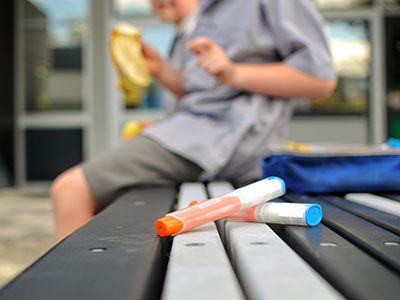Handing over the important responsibility of managing your child’s healthcare needs can be daunting. However, you can assure your child’s school is ready to respond to his/her health needs by taking proper steps to prepare your child’s medications and medical plans for the school and by communicating effectively with the teachers, school nurse and administration.
General recommendations
- Medications should be labeled with the original pharmacy label.
- If a medication must be administered during school hours, have your pediatrician fill out a form with instructions. This may include temporary and topical medications such as eye drops or skin creams.
- Inform your child’s school about any physical activity restrictions that are needed, and supply any necessary documentation from your pediatrician indicating these restrictions.
- Check expiration dates on chronic medications and renew annually when indicated, even if they were not used.
- Ask your school officials about their policy for administration of over-the-counter medications such as antihistamines or pain relievers should these be needed.
- Communicate openly (and frequently) with your child’s teachers, school nurse and administration about your child’s health needs.
Food allergies
Notify your child’s school of any food allergies. Your pediatrician should fill out a “food allergy action plan,” which includes the food(s) to which your child is allergic, symptoms to watch for, and medications to administer.
For food allergies requiring epinephrine devices, it is best for your child to have two devices available at all times. Your pediatrician can typically prescribe multiple devices to supply both home and school. Discuss with your pediatrician and school nurse when your child may be ready to self-carry and self-administer epinephrine, which may allow quicker administration in the case of an emergency. Your child should be able to demonstrate that he/she knows when and how to administer the epinephrine before he/she can self-carry. If determined that your child should self-administer an emergency medication (epinephrine or other), it should be kept on your child’s person at all times (consider a medication “fanny pack”) or passed to an adult to hold when your child is not able to carry. It should never be left unattended. Remind all parties to call 911 immediately any time your child requires the use of injectable epinephrine.
Asthma
Your pediatrician should fill out an “asthma action plan,” which includes the severity of asthma, likely triggers, and a medication plan. Maintenance medications can usually be given at home, but a rescue inhaler should be available for your child at all times as well as a spacer chamber device. Again, you can ask your pediatrician to prescribe extra inhalers and spacer chambers to keep at home and school. Similar self-carry and administration guidelines apply as above. Your child should know who to alert should he/she self-administer the inhaler.
 https://riseandshine.childrensnational.org/wp-content/uploads/2025/08/epi-pens-feature.jpg
300
400
Danielle Robbins
https://riseandshine.childrensnational.org/wp-content/uploads/2017/11/childrens_riseandshine_logo.jpg
Danielle Robbins2025-08-26 12:24:232025-08-26 16:12:43Back-to-school safety tips for kids with food allergies
https://riseandshine.childrensnational.org/wp-content/uploads/2025/08/epi-pens-feature.jpg
300
400
Danielle Robbins
https://riseandshine.childrensnational.org/wp-content/uploads/2017/11/childrens_riseandshine_logo.jpg
Danielle Robbins2025-08-26 12:24:232025-08-26 16:12:43Back-to-school safety tips for kids with food allergies


 Lauren Martin, MD, was a pediatrician at Children's National. She also completed her residency and internship programs at Children's National.
Lauren Martin, MD, was a pediatrician at Children's National. She also completed her residency and internship programs at Children's National.


















Leave a Comment
Want to join the discussion?Feel free to contribute!